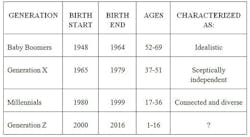Why Millennials are important for the future of your business
Imagine this: You’re a 57-year-old plumbing contractor who, after much deliberation and careful thought, has decided to hire another employee.
The union halls are empty, construction is booming and there is just no one around. You post in other cities trying to lure them to you, but it’s the same situation: not enough qualified plumbers. Ergo, you’ve decided to hire someone new to the plumbing and heating business, so you can put your own thumbprint on their training.
You place an ad in the newspaper and finally, after two weeks, someone calls to set up an appointment to meet. He seems pleasant enough on the phone, if not a little hesitant about becoming a plumber, because he has a four-year degree in Fermentation Science from Appalachian State University.
He explained that he couldn’t find any employment in his field of choice, and he had amassed a staggering level of college debt. He needs some money and heard that plumbers also get to set their own hours, so he was interested in that.
After the phone conversation, you decide to meet with him at a coffee shop rather than your office (easier to run if necessary). You arrive early (as always) and order a coffee and wait. And wait. Finally, 20 minutes after the appointed time, your potential new hire walks through the door. He introduces himself, “Hi, I’m Brynlee.” He settles into the chair explaining, “Sorry I’m late, but some friends and I were binge-watching Empire last night, and time just got away. I hope that’s not a problem,” as he eases an obstinate lock of hair back into his man-bun.
He has a nose ring and a tattoo that goes the entire length of his left arm that says “Middle Earth” with a half-dozen short people with long hair, robes, swords and pointy ears.
Brynlee reaches into his man-purse, pulls out his iPhone and says, “My résumé is posted on LinkedIn. I’ll tweet you the info if you’ll give me your Twitter handle. I’ll send you a hilarious emoji too! By the way, I hope you don’t want me to start tomorrow, because I just got a Yik Yak that Beyoncé is happening. Next week would be perf.”
You look around the coffee shop to see if Rod Serling is standing somewhere because you can hear the Twilight Zone theme song playing.Welcome to the world of Millennials
By 2025, Millennials will constitute 75 percent of the workforce (Department of Labor). Today, there are four main groups of people in the workforce, according to the U.S. Chamber Of Commerce, and they are represented by the ages listed below.
Each of these groups represents a demographic group with characteristics and behavior patterns that are unique and sometimes very different.
According to U.S. Census Bureau Statistics, Millennials are characterized as the largest of the four generational groups, representing 80 million people. This group will shape the job market for the next three decades.
Their almost unlimited access to media during their formative years has caused them to be shaped by some very tragic events: the 9/11 terrorist attacks, Hurricane Katrina, church sex scandals, impeachment of a president, school shootings, the recession, the rise of social media, skyrocketing divorce rates and racial tension. This is why only 19 percent of Millennials agree with the statement, “Most people can be trusted,” compared with 31 percent of Baby Boomers (Brookings Institute Study). Still, as a group, Millennials remain very optimistic; however, they are very suspicious of big companies (83 percent).
Depending on which study you read, they are often characterized as being overly self-confident, self-absorbed, undisciplined, too socially preoccupied, lacking goals and objectives, and difficult to train. But these are dubious, counterproductive generalizations that won’t help your company assimilate them into your future plans, nor get the infusion of new talent that your company needs.
To put a finer point on it, I think there is a “Chicken Little” philosophy concerning Millennials that is overstated. I don’t think the sky is falling, but I do think the sky is changing color.
For example, I have six grandchildren who are Millennials, and none are like that at all — nor are their friends. But they do think different — they are different — than my generation. No question about it, their priorities are different — about as different as my priorities were from those of my parents.
For example, they have a much higher regard for the environment, pollution and ecology than I do, even though I thought I had been quite a champion. They also are much more concerned about social injustice and personal self-growth than they are about careers or money. These last two are subordinate to the first two. They don’t dismiss careers and money; it’s just that these are not their top priorities.
I have heard many stories of people who have run into the Brynlee’s of life. I’m sure you have heard stories as well. But the bottom line is, Millennials are the future source of new hires and new tradespeople. We just have to find a way to reach out to them and bring them into our trades if we are to move on.
So let’s start with a short introduction to Millennials by reviewing a catalog of “Myths and Truths.”
Myth No. 1: Millennials are not motivated.
Truth: I have found dozens and dozens of articles in all the major business magazines that say Millennials are indeed motivated. In fact, CEB, a consulting firm that polls 90,000 employees every quarter, wrote that their research shows Millennials are nearly twice as competitive as Baby Boomers. It’s not that they are not motivated; it’s just that they are motivated in a different way. That’s the key.
Myth No. 2: Millennials want to receive their information digitally.
Truth: Millennials are not digital addicts whose only social outlet is Facebook, sharing their intimate lives without personal boundaries. They use digital electronics because they know how! They are not afraid of gadgets or electronic media because they grew up with them. That can be a real plus to your business. They can help you improve your company’s website and reach customers you couldn’t reach any other way.
If, indeed, Millennials are going to be the biggest demographic in just a few years, you’d better have a couple of them around to help reach other Millennials. Also, studies have shown that the Millennials — contrary to what you hear — prefer to have interviews in person. They prefer to have performance reviews in person, and they prefer to be corrected in person.
Myth No. 3: Millennials have a very short attention span.
Truth: Millennials have grown up with a Gameboy in their hands, watching TV with their eyes and an earbud in each ear to listen to tunes. They have become quite adept at multitasking, which gives the appearance of having a short attention span. This is not a disadvantage if harnessed. Unlocking this multitasking capability is healthy and positive for you and them.
Myth No. 4: Millennials have an entitlement mentality.
Truth: Many of these Millennials graduated high school right in the middle of the worst recession we have faced since the Great Depression. They watched their parents and their friends’ parents lose their jobs, their homes and their retirements. They came into a job market that had fewer openings, lower pay, and more debt than any other generation.
This is hardly the environment that harbors entitlement. The fact of the matter is that a majority of the Millennials are afraid. If there is an issue, it isn’t entitlement; it is with loyalty. They have watched their parents lose their jobs and pensions with companies they had been with all their adult lives, while they were helpless to stop it.
They have watched as large corporations seem to have no heart when it comes to layoffs. Watching all of this, they ask the question, “Why be loyal?” This is where your company today will have to reach out to them and provide assurance and inclusion. This is what they are looking for: not for entitlement, but to be included. The best way to help a Millennial fit into your company is to instill a sense of ownership.
Myth No. 5: Millennials care only for themselves.
Truth: Actually, the truth is that they care for everything in a much greater capacity than Baby Boomers. They are concerned about equality, the environment, and the world as a whole, as well as what they can do to make an impact. And, yes, they do care about their own self-image, but don’t let that be the only thing you see in them. Probe a little deeper and you will see a compassionate and caring generation. For your company, these could be just the customer-oriented people you are looking for.
To wrap things up, let me finish with a question: How many Millennials does it take to change a light bulb?
Answer: None. They won’t change a light bulb. They will replace it with an LED. And that’s the truth. They are bringing a whole new agenda with them. It’s refreshing and powerful and brings a new passion. You can accept it, you can reject it, but you can’t change it.
In a future issue, I will return with a followup article that addresses these issues and how you and your company can leverage these characteristics to your advantage. We will discuss how to attract, assimilate and retain Millennials by providing meaningful careers to them and great employees for your company.
In the meantime, I would be grateful to hear your thoughts, ideas and stories. Until then, best regards and happy heating!
Steve Swanson is the national trainer at Uponor Academy. He actively welcomes reader comments and can be reached at [email protected].
About the Author
Steve Swanson
Steve Swanson is the customer trainer at Uponor Academy. He actively welcomes reader comments and can be reached at [email protected].


